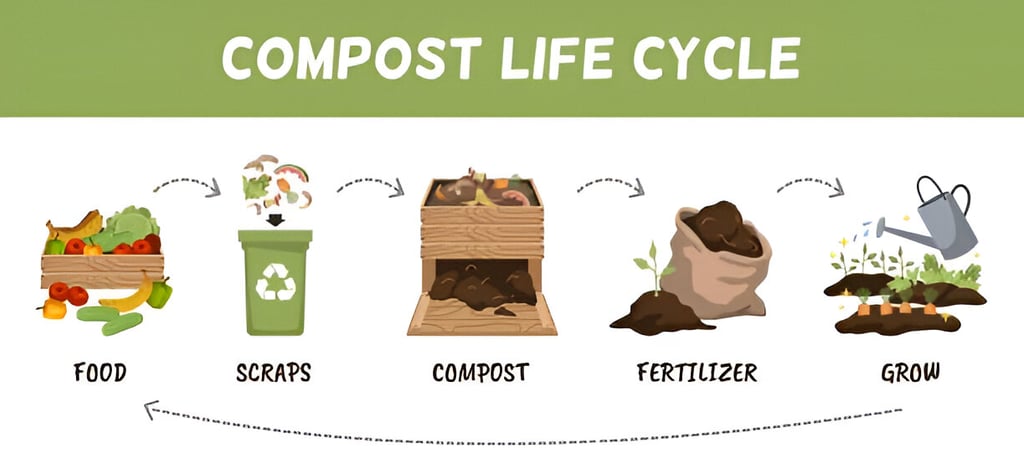Transforming Kitchen Waste into Compost: Nature’s Own Fertilizer
Kitchen Waste to Garden Gold
Mr.Parthipan Loganathan, EGF India
1/15/2025


Kitchen Waste to Compost – Nature’s Own Fertilizer
Every day, our kitchens produce scraps—vegetable peels, fruit skins, coffee grounds, eggshells, and leftover food. Most of the time, this waste ends up in landfills, where it decomposes without oxygen, releasing harmful methane—a greenhouse gas 25 times more potent than carbon dioxide.
But what if this waste could be transformed into something beneficial for your garden, your wallet, and the planet?
That’s exactly what composting does. It turns ordinary kitchen waste into rich, organic fertilizer that gives new life to plants and restores the soil’s natural fertility.
What is Composting?
Composting is a natural biological process where microorganisms, fungi, worms, and bacteria break down organic waste into a nutrient-rich, dark, crumbly substance known as compost or “black gold.”
Unlike chemical fertilizers, compost is:
* 100% organic
* Free of harmful additives
* Rich in beneficial microbes
* Sustainable and environmentally friendly
Whether you have a garden, a few pots on your balcony, or a small patch of soil, compost improves plant growth, increases water retention, and supports biodiversity in the soil.
What Can Go Into Compost?
Not everything from your kitchen belongs in the compost bin. Knowing what to add—and what to avoid—will make your compost healthy and effective.
Green (Wet) Waste – High in Nitrogen
* Vegetable & fruit peels
* Coffee grounds & tea leaves (without bags if they're plastic-lined)
* Eggshells (crushed for quicker breakdown)
* Cooked rice, bread, or plain food (in small quantities)
* Fresh garden trimmings and weeds (avoid seed heads)
Brown (Dry) Waste – High in Carbon
* Dry leaves, twigs, and sawdust
* Shredded newspaper or cardboard (avoid glossy prints)
* Paper napkins and tissue (if not heavily soiled)
* Coconut husk or coir
Avoid These
* Plastic, glass, and metal
* Dairy products and oily foods
* Meat, bones, and seafood
* Pet waste (cat litter, dog feces)
* Synthetic chemicals and cleaning products
How to Start Composting at Home
You don’t need a big backyard or fancy equipment to start. Composting can be done easily in small spaces too.
1. Choose Your Composting Method
* Outdoor Pit or Pile: Ideal for those with gardens.
* Compost Bin: Purchase or build a container to hold waste.
* Balcony Composting: Use a clay pot, bucket, or stackable bin system.
* Vermicomposting: Use red worms to speed up the process indoors.
2. Create Layers
Start with a layer of dry waste (like leaves or paper), then add wet waste (like peels or scraps). Always alternate green and brown waste to balance nitrogen and carbon.
3. Maintain Moisture and Aeration
Compost should feel like a wrung-out sponge—*not too dry, not too soggy**.
* Stir or turn it every 3–5 days to provide oxygen and prevent odor.
4. Let Nature Work
Within 30–60 days (or sooner with good balance), you’ll notice dark, earthy-smelling compost ready to nourish your soil.
Benefits of Composting
✅ Reduces Household Waste: Less garbage means reduced strain on municipal waste systems.
✅ Fights Climate Change: Cuts down methane emissions from landfills.
✅ Enriches Soil Naturally: Boosts microbial activity and improves soil structure.
✅ Supports Healthy Plant Growth: Strengthens plant immunity and productivity.
✅ Saves You Money: Say goodbye to synthetic fertilizers and soil conditioners.
✅ Encourages Responsible Living: Cultivates an eco-conscious lifestyle.
Pro Tips for Successful Composting
* Chop it small: Smaller pieces decompose faster.
* Keep it balanced: Aim for a 2:1 ratio of browns to greens.
* No foul smells: A healthy compost pile smells earthy. If it stinks, adjust the greens/browns or add more dry material.
* Use finished compost wisely: Mix into potting soil, sprinkle on garden beds, or use as a top dressing for plants.
Small Step, Big Impact
Composting may seem like a humble task, but its effects ripple outwards:
* Cities become cleaner.
* Landfills shrink.
* Air and water become less polluted.
* Gardens thrive.
* Carbon footprints shrink.
All this from the simple act of returning nature’s gifts to where they came from.
Join the Composting Movement
Imagine if every home, school, and office took a little time each day to compost. The collective impact would be staggering. More greenery, less waste, cleaner communities, and a healthier planet for future generations.
So next time you peel a banana, brew your coffee, or toss veggie scraps, don’t throw them away—compost them.
Give back to the earth, and watch life bloom around you.
Certainly! Here's a well-crafted conclusion to wrap up your composting guide:
Conclusion: Turn Waste Into Worth
Composting is more than just a method of waste disposal—it's a mindset shift toward sustainability. By converting everyday kitchen scraps into rich, organic compost, you're not only reducing the burden on landfills but also nurturing life right from your own home.
Whether you have a backyard garden or a few balcony pots, composting empowers you to close the loop between consumption and nature. It’s a simple habit with profound benefits—for your plants, your community, and the planet.
Start small, stay consistent, and let nature do the rest. Your banana peels, coffee grounds, and vegetable scraps are not waste—they're the beginning of something beautiful.
So don’t wait for change—"be the change. Compost today, and grow a greener tomorrow."
